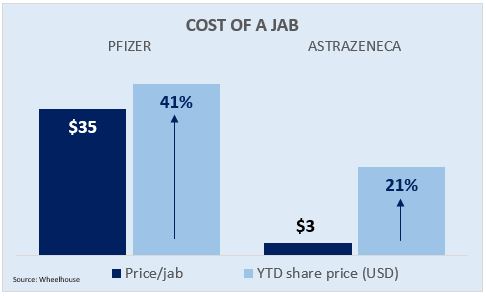Pfizer’s jab costs $35... versus $3 for AstraZeneca’s. Sound fair?
When receiving my jab last month (thank you nurses at RBWH in Brisbane for your excellent care!) I couldn’t help wondering how much all these vaccines were costing.
From a purely supply and demand perspective, the drug companies should be able to name their price. How much would our government have paid for an extra 1 million Pfizer doses delivered two months ago? How much did we pay Poland on the secondary market for 1 million does last week?
So how much are they?
As it turns out, the answer depends upon what brand you receive.
Reported global prices for Pfizer are around AUD$35 per jab and AstraZeneca are around AUD$3. The price difference is staggering when put in context of the billions of doses required to vaccinate most of the global population.
Why so different?
The price difference is due to the vastly different profit motives for this particular vaccine. AstraZeneca is pricing their COVID-19 vaccine on a not-for-profit basis, at least until the pandemic is under control. Johnson & Johnson have done the same with their Covid vaccine.
However Pfizer, Moderna and Novavax have made no such election and are generating profits... very large profits.
In the recent Pfizer 2Q earnings release, Pfizer upgraded 2021 revenue expectations for their COVID-19 vaccine to US$33bn, which at that level will account for nearly one-third of the companies entire annual revenue. For AZN, the profit impact is expected to be zero.
The profitability of Pfizer’s Covid vaccine is impacting the share price. Year-to-date the shares are up nearly 40%, versus AZN only up 20% (in USD).

We own both Pfizer and AstraZeneca in our Global fund, and we contacted the Morningstar Healthcare Analyst in Chicago about what we felt was a potential ESG concern on pricing.
The key difference, they explained, is the enormously different development risks assumed by the two companies:
- AstraZeneca partnered with Oxford University, who largely developed the science and were mostly government-funded. While AZN had limited experience in vaccine development, they were skilled in drug testing and marketing/distribution. By taking essentially no developmental risk, and arguably with some encouragement from the UK government for an all-UK Covid vaccine solution, AZN agreed to partner with Oxford University to manage trials, manufacture and distribute their vaccine on a not-for-profit basis. At least until the pandemic is over.
- Pfizer on the other hand, accepted very little government assistance. The company committed nearly US$1 billion of their own capital to develop and bring their vaccine to market. This is despite the Pfizer vaccine relying on an unproven technology versus all previous vaccines, which increased the risk of the project. (The Pfizer and Moderna vaccines use a previously untested mRNA approach, versus AstraZeneca using a well-proven ‘viral vector’ process.)
From a pricing perspective, at $35 Pfizer’s vaccine is materially discounted relative to vaccines for many other diseases. For example, a Measles Mumps and Rubella vaccination is commonly listed at around US$100 in the US, although in Australia it’s closer to A$30.
Furthermore, while Pfizer may be generating a mutli-billion dollar profit on the vaccine, it should also be also considered how many hundreds of billions of dollars in economic growth that their vaccine has created by enabling the world to get back to work faster. Even if they priced their vaccine at $300/shot, we suggest the economics would likely look favourable relative to one person on JobKeeper for even a week.
So which price is 'right'?
Every investment decision, whether by an investor or a company, requires an assessment of risk and return. ESG considerations are also critically important and should form part of this decision process.
In Pfizer’s case, after committing significant shareholders' capital to a relatively speculative project, we celebrate their economic success and the benefit their vaccine has conferred onto society and the economy. Perhaps a judgement call, but to us their pricing seems perfectly reasonable (they plan to charge developing nations far less than $35).
Equally with respect to AstraZeneca, the company accepted a project with zero direct economic gain, but also very limited economic loss. In exchange, they gained valuable experience in a new channel (vaccines), and we believe built significant goodwill with the NHS and their home nation, the UK.
Bravo
Bravo scientist Sarah Gilbert from Oxford
University who received a standing ovation at Wimbledon earlier this year for
her team’s work on the AstraZeneca-Oxford vaccine. Bravo also to the nurses at
the RBWH, along with all other scientists, nurses and frontline workers everywhere who continue
to develop and distribute these amazing vaccines.
Sound fair?
If you enjoyed this wire please give it a like and let us know your thoughts on vaccine pricing during a pandemic by leaving a comment below.
Addendum
We focused on profit motive in this article, although we should add that the manufacturing costs for an mRNA vaccine are considerably higher than a conventional 'viral vector' vaccine. In addition, Pfizer pays 50% of gross profit to BioNTech for most global regions which increases their cost of sales materially.
3 topics

